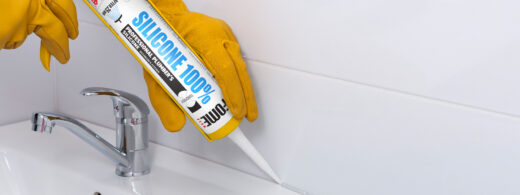
When setting up a new home or starting an interior renovation project, it is important to know which products to use. Various professional products, such as silicone sealants, make the job easier. However, there are a few basic rules to follow when using them.
Choosing a colour
Silicone sealants are mainly used for interior applications such as sealing bathtubs, shower enclosures, sinks and various interior plumbing units. The most popular silicone sealant used by professionals, according to Tegra State experts, is 102 Sanitary Silicone from the Fome Flex line. It has one of the highest mould resistance ratings of S1. Experts praise its elastic recovery — up to 90% of the seam is recovered after compression, while the tensile strain to rupture is as high as 400%, and such a durable and elastic seam is formed in just 7 to 10 minutes. The hardened sealed surface can withstand temperatures of up to 150 degrees.
This silicone sealant is also distinguished by its wide range of colours — clear, grey, black, brown, white and beige. All these features make this Fome Flex silicone sealant suitable for a wide range of glazing and sanitary applications — baths, sinks, washbasins, shower enclosures, swimming pools, plumbing, drainage and sealing PVC pipe joints. The verdict of the professionals is that it is the golden mean of price and quality.
A special product for glazing work
However, in some cases, 102 Sanitary Silicone is not suitable for more sensitive surfaces such as acrylic baths. Fome Flex silicone sealant Neutral, which does not corrode non-ferrous metals and does not change the natural colour of the stone, is then recommended. It also has an S1 mould resistance rating and is specially formulated for durable and resilient sealing of joints, ideal for use in kitchens, bathrooms and showers.
For highly elastic sealing and bonding and an even higher XS1 mould resistance class, Fome Flex SILICONE 100% is recommended. It is an economy class product for sealing sanitary installations and window frames, joining ceramic tiles, small repairs when working with impregnated wood, glass, enamel and other building materials.
However, for glazing work, such as the installation of all-glass shower enclosures or the sealing of mirrors, it is advisable to use Glazing & Window Production — Fome Flex silicone sealant, which is specially formulated for window manufacturers and comes with numerous certificates. It’s worth noting that not only is it UV, moisture and mould-resistant, but it also has an elastic recovery of up to 99%.
What mistakes to avoid?
Professionals looking for the highest quality choose Fome Flex white or clear silicone sealant SILICONE 100%. It has XS1 maximum mould protection, one of the highest Shore A hardness and a 20% seam deflection, resulting in a durable seam that is highly resistant to mechanical stress. The film forms in just five minutes and the ultra-fast polymerisation time allows you to use your shower, bathroom or kitchen sink in just 25 minutes. Thanks to its reliability, thermal resistance of up to 180 degrees and other features, the product comes with a warranty of up to 10 years.
CE marking should be taken into account when choosing a silicone sealant. Silicone sealants for professional use generally have four certificates: F, indicating that the product is suitable for indoor and outdoor use; G, indicating that the product is suitable for glazing; S, indicating that the product is suitable for use in areas where there is a high concentration of water and is mould resistant; and a certificate indicating that the product is suitable for sealing gaps.
It is also worth paying attention to the instructions and basic rules for using silicone sealants. First of all, the surfaces to be sealed must be clean and dry — they must be dust-free, without grease or oil. Silicone sealants can only be used at temperatures between 5 and 40 degrees Celsius. One of the biggest mistakes, which dates back decades, is to rub the seam with your finger. This results in a less than an ideal seam, the seam is adversely affected by the removal of masking tapes and soapy water destroys the anti-foaming properties. Therefore, the use of special spatulas is suggested for sealing work, depending on the location to be sealed. In most cases, the seam is fully hardened within a day, and for more precise information you should read the leaflet or contact Tegra State experts.